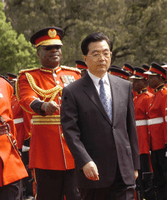The tiny desert town of Abeche, in eastern Chad, offers a curious sight: Sandwiched between the mud huts that most people call home and the compounds belonging to international aid workers is a humble Chinese restaurant catering to Chad's growing population of Chinese engineers and managers. Significantly, no equivalent American-style restaurant is to be found. The same holds true across the resource-rich, institution-poor developing world, in countries as remote as East Timor and as dangerous as Somalia. While much of the military establishment in Washington continues to plan for a possible conventional war with China, Beijing is studiously avoiding a direct confrontation, instead expanding its influence through means other than traditional warfare. Principal among them is the deployment of Chinese technocrats abroad on profit-seeking missions for the world's third-largest economy. A series of events in Washington in March and April highlighted the ways in which the U.S. is struggling to come to terms with a rising China, whose greatest strength -- even during a global recession -- is not military, but rather economic in nature. Therein, too, lies its greatest threat to U.S. interests.
War is Boring: U.S. Struggles to Adapt to China’s Economic Strategy

